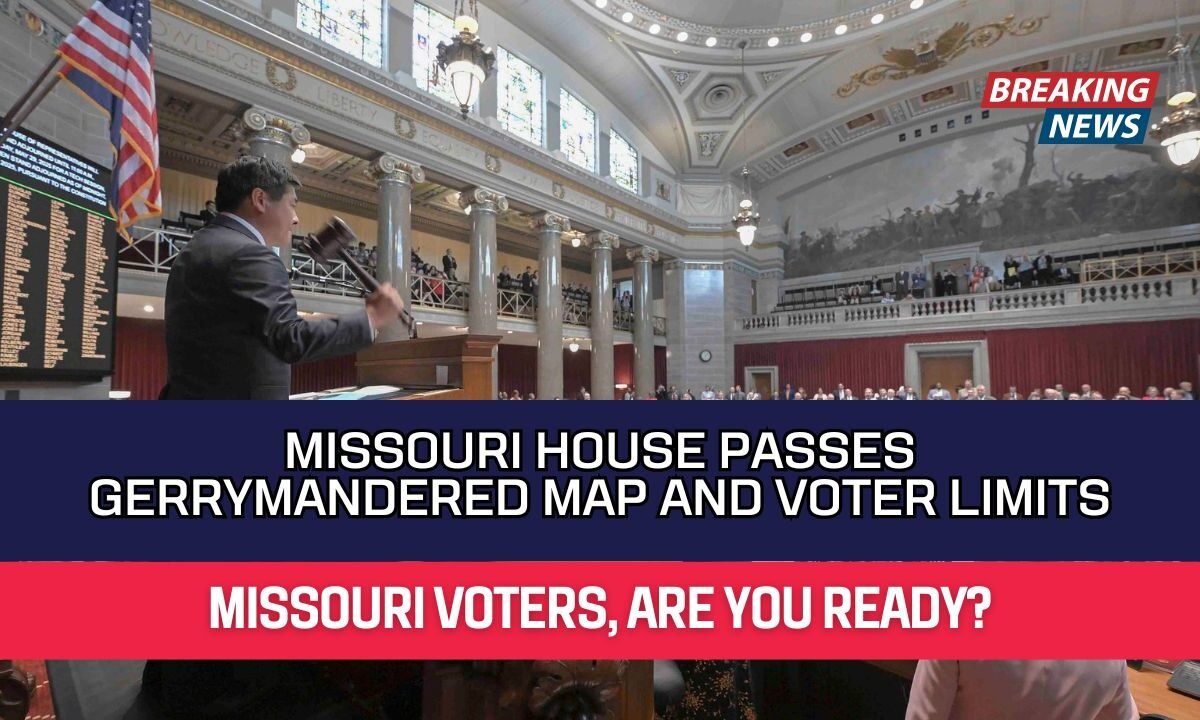The Missouri House of Representatives has approved two controversial bills that could reshape the state’s politics. One bill redraws the congressional map to give Republicans more control.
The other bill makes it harder for citizens to change the state constitution through petitions. Both measures now move to the Missouri Senate, where Democrats are preparing to fight back with filibusters and legal challenges.
These changes are not just about politics—they could impact how voters in Missouri make decisions, pass laws, and choose leaders in the future.
What Happened in the Missouri House
The Missouri House passed the bills after two days of heated debate. The first bill focuses on redrawing districts to weaken Democratic influence, particularly in the 5th District held by Rep.
Emanuel Cleaver of Kansas City. This district will be split into three, making it harder for Democrats to win.
The second bill targets the initiative petition process, which allows voters to bring constitutional amendments to the ballot. Under the new plan, a measure would need both a statewide majority and a majority in all eight congressional districts to pass.
Why the Map Was Redrawn
Republican leaders say the new map gives a “fairer” reflection of the state. Governor Mike Kehoe called lawmakers into a special session after pressure from former President Donald Trump to secure more Republican seats before the 2026 midterm elections.
Supporters of the map, like Rep. Dirk Deaton, claim it better represents Missouri. Critics, however, call it a clear case of gerrymandering—changing district lines to favor one political party.
Why the Petition Process Was Changed
Missouri has often used citizen petitions to change state laws, including legalizing medical marijuana, recreational marijuana, and expanding Medicaid. Recently, abortion rights were also restored through this process with just over 52% of the vote.
Republicans argue that the process is too easy and heavily influenced by out-of-state groups. The new rules mean as few as 5% of voters could block any statewide initiative. Democrats argue this undermines one person, one vote.
Voices of Support and Opposition
- Republicans’ View: They argue the reforms will ensure that only proposals with broad support across the state make it into the constitution.
- Democrats’ View: They call the bills a power grab, designed to weaken democracy and give Republicans long-term control.
- Dissent within GOP: Rep. Bryant Wolfin opposed both measures, saying politics in Missouri is now only about “power,” not ethics or liberty.
Lawsuits and Legal Challenges
The Missouri NAACP has already filed a lawsuit, arguing the governor’s call for a special session was unconstitutional. Rep. Cleaver has also promised legal action against the map.
Labor unions are considering a referendum campaign, similar to what happened in 2018 when Missouri voters repealed a right-to-work law after unions collected more than 300,000 signatures.
What Happens Next
The bills now go to the Missouri Senate, where Democrats plan to filibuster and slow things down. If Republicans push through, voters may see these issues on the 2026 ballot.
Senate Republican leaders say they are determined to pass both measures, with Senate President Cindy O’Laughlin declaring:
“We are not California. We are not progressives.”
Key Information
| Issue | Details |
|---|---|
| Congressional Map | Redraws districts to give GOP 7 of 8 seats, targeting Cleaver’s 5th District |
| Petition Process Change | Requires majority statewide and in all 8 districts to pass amendments |
| Impact | As little as 5% of voters could block measures statewide |
| Legal Challenges | NAACP lawsuit filed, Cleaver may sue, unions may seek referendum |
| Next Step | Bills head to Missouri Senate for debate and possible filibuster |
The fight over Missouri’s district maps and petition process is more than just politics—it’s about how democracy works in the state. Republicans believe these changes protect Missouri from outside influence, while Democrats see them as an attack on voter rights and fair elections.
With lawsuits, possible referendums, and Senate battles ahead, this issue will likely remain at the center of Missouri’s political debate for years to come. The outcome could shape not only 2026 elections but also the future of citizen power in Missouri.




